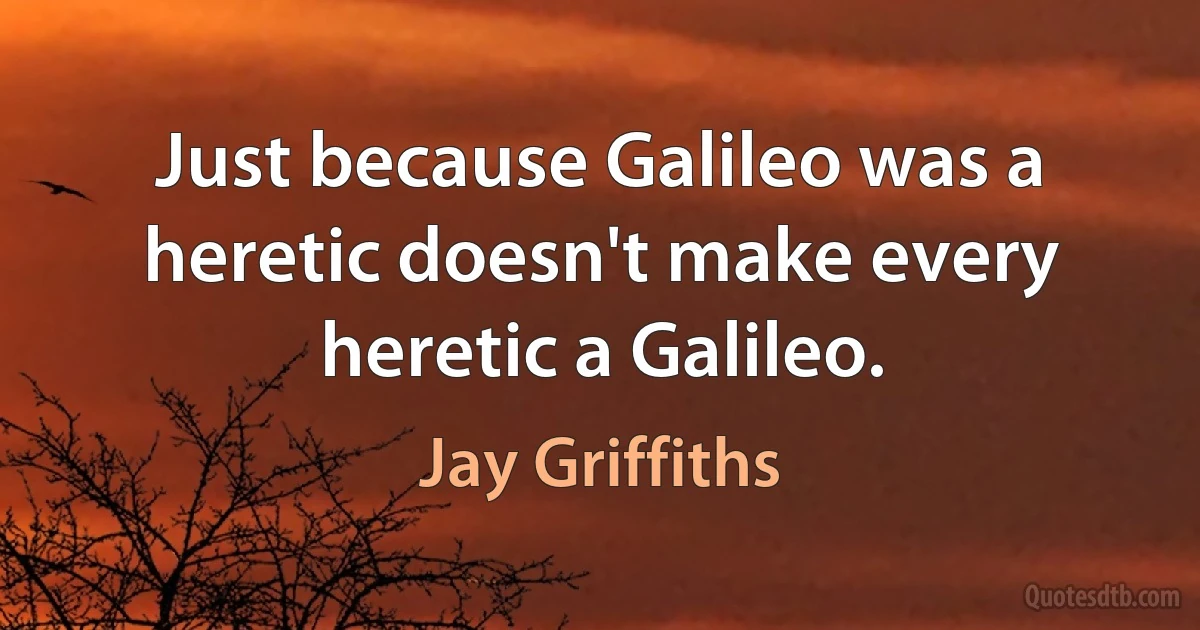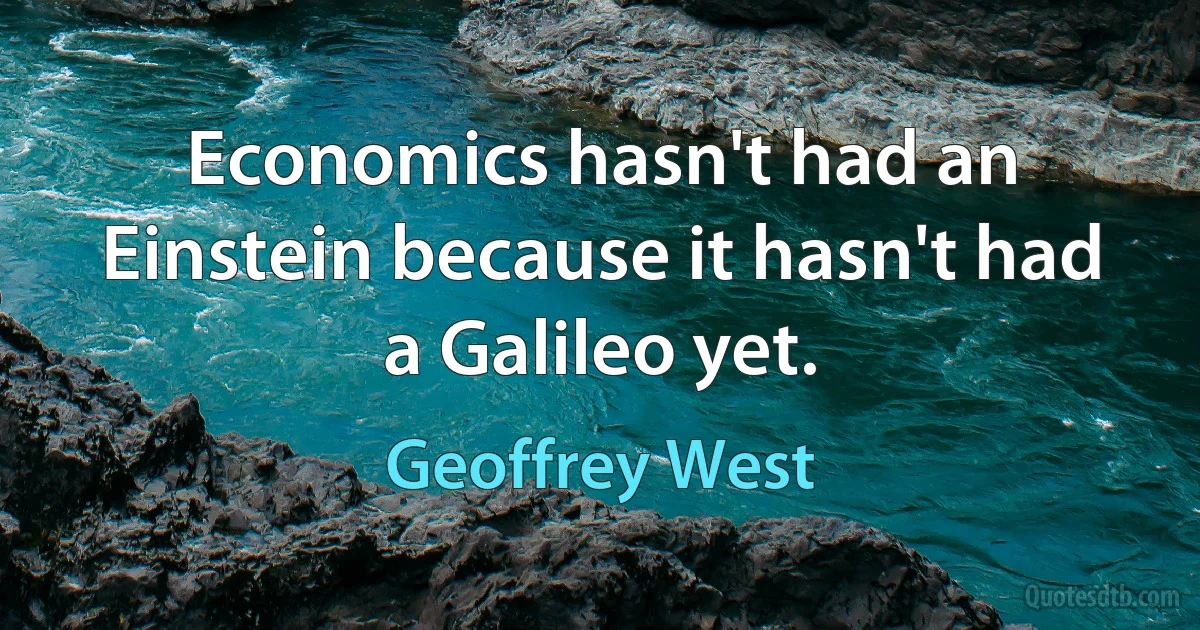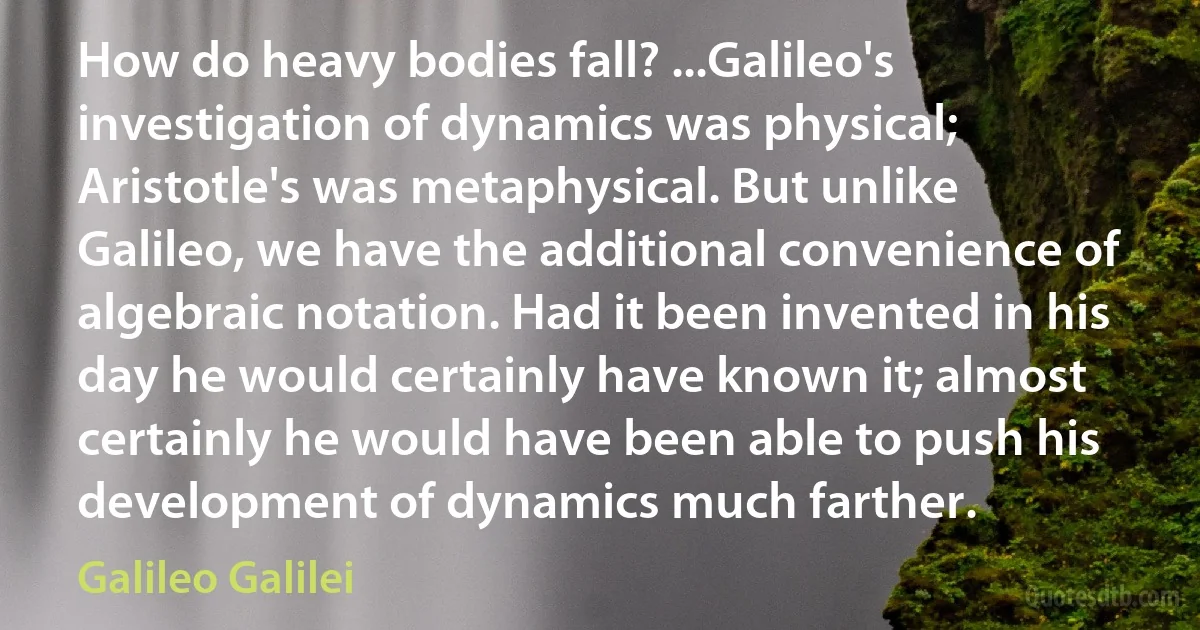Galileo Quotes - page 3
One of the things that always fascinated me about the Renaissance was that it was a time both of great scientific discovery and also of superstition and belief in magic. And so it was a period in which Galileo invented the telescope, but also a time when hundreds were burned at the stake because people thought they were witches.

Marie Rutkoski
Perhaps, I can express more fully in verse ideas and emotions which run counter to the inert crystallized opinion - hard as a rock - which the vast body of men have vested interests in supporting. If Galileo had said in verse that the world moved, the inquisition might have let him alone.

Thomas Hardy
Yet where were answers to the truly deep questions?
Religion promised those, though always in vague terms, while retreating from one line in the sand to the next. Don't look past this boundary, they told Galileo, then Hutton, Darwin, Von Neumann, and Crick, always retreating with great dignity before the latest scientific advance, then drawing the next holy perimeter at the shadowy rim of knowledge.

David Brin
I am not very impressed with theological arguments whatever they may be used to support. Such arguments have often been found unsatisfactory in the past. In the time of Galileo it was argued that the texts, "And the sun stood still... and hasted not to go down about a whole day" (Joshua x. 13) and "He laid the foundations of the earth, that it should not move at any time" (Psalm cv. 5) were an adequate refutation of the Copernican theory.

Alan Turing
Science teaches us to be very suspicious of grand generalizations...Aristotle had a set theory of the universe, and he didn't get too far. Galileo started with simple things like pendulums and balls sliding down inclined planes, and he got much further. You never find surprises when you think in terms of broad generalities. Both quantum mechanics and relativity grew out of trying to really understand essentially simple things.

Frank Wilczek
[I]t was upon... inequality of motions in point of velocity that Galileo built his theory of flux and reflux of the sea; supposing that the earth revolved faster than the water could follow; and that the water was therefore first gathered in a heap and then fell down, as we see in a basin of water moved quickly. But this he devised upon an assumption which cannot be allowed, viz. that the earth moves; and also without being well informed as to the sexhorary motion of the tide.

Galileo Galilei
Copernicus had taken one course in treating the earth as virtually a celestial body in the Aristotelian sense-a perfect sphere governed by the laws which operated in the higher reaches of the skies. Galileo complemented this by taking now the opposite course-rather treating the heavenly bodies as terrestrial ones, regarding the planets as subject to the very laws which applied to balls sliding down inclined planes. There was something in all this which tended to the reduction of the whole universe to uniform physical laws, and it is clear that the world was coming to be more ready to admit such a view.

Galileo Galilei
Galileo is the founder of the science of dynamics. Among his contemporaries it was chiefly the novelties he detected in the sky that made him celebrated, but Lagrange claims that his astronomical discoveries required only a telescope and perseverance, while it took an extraordinary genius to discover laws from phenomena, which we see constantly and of which the true explanation escaped all earlier philosophers. The first contributor to the science of mechanics after Galileo was Descartes.

Galileo Galilei
His conflict with the Catholic Church arose because deep in his heart Galileo was a believer. There was for him no path of compromise, no way to have separate secular and theological cosmologies. If the Copernican system was true as he believed, what else could Galileo do but fight with every weapon he had in his arsenal... to make his Church accept a new system of the universe. ...In the contrast between Galileo's heroic stand when he tried to reform the cosmological basis of orthodox theology and his humbled, kneeling surrender when he disavowed his Copernicanism, we may sense the tremendous forces attendant on the birth of modern science.

Galileo Galilei
Koyré's exaltation of the "Platonic and Pythagorean" elements of the Scientific Revolution... was based on a demonstrably false understanding of how Galileo reached his conclusions. Koyré asserted that Galileo merely used experiments as a check on the theories he devised by mathematical reasoning. But later research has definitively established that Galileo's experiments preceded his attempts to give a mathematical account of their results.

Galileo Galilei
It is to the Italian astronomer, forced in old age by the Inquisition to turn aside from the more dangerous study of the machinery of the heavens, that we owe the first exposition of many of the problems of mechanics and statics, published... in 1638. Not only did Galileo put together whatever the sixteenth century had learned in the sciences affecting building construction, but from his study of the bending strength of a beam there dates a new branch of science-the theory of the strength of materials.

Galileo Galilei
The allusion to the "puzzling" problem of [the orbit of] Mars shows that Galileo ought not to have been unaware of the great work of Kepler published in 1609: Astronomia nova... in which the first two of Kepler's laws were formulated. Yet he does not mention here at all Kepler's success in solving the problem, nor his laws, nor his name even, which is brought up... only to criticize his belief in the Moon's attraction [effect upon tides], which is quite reasonably presented in the Astronomia nova and founded on astronomical reasons and not on mystical speculations.

Galileo Galilei
[T]he mathematical habit of mind and the mathematical procedure... had to be generated; otherwise Newton could never have thought of a formula representing the force between any two masses at any distance. ...Throughout the middle ages, under the influence of Aristotle, the science was entirely misconceived. Newton had the advantage of coming after a series of great men, notably Galileo... who in the previous two centuries had reconstructed the science and had invented the right way of thinking about it. He completed their work.

Galileo Galilei
In Galileo's time, professors of philosophy and theology-the subjects were inseparable-produced grand discourses on the nature of reality... all based on sophisticated metaphysical arguments. Meanwhile, Galileo measured how fast balls roll down inclined planes. How mundane! But the learned discourses, while grand, were vague. Galileo's investigations were clear and precise. The old metaphysics never progressed, while Galileo's work bore abundant, and at length spectacular, fruit. Galileo too cared about the big questions, but he realized that getting the genuine answers requires patience and humility before the facts.

Galileo Galilei
I spoke after Sasha, for an hour. I discussed the farce of a government undertaking to carry democracy abroad by suppressing the last vestiges of it at home. I took up the contention of Judge Mayer that only such ideas are permissible as are "within the law." Thus he had instructed the jurymen when he had asked them if they were prejudiced against those who propagate unpopular ideas. I pointed out that there had never been an ideal, however humane and peaceful, which in its time had been considered "within the law." I named Jesus, Socrates, Galileo, Giordano Bruno. "Were they 'within the law"?" I asked. "And the men who set America free from British rule, the Jeffersons and the Patrick Henrys? The William Lloyd Garrisons, the John Browns, the David Thoreaus and Wendell Phillipses-were they within the law?"

Emma Goldman



